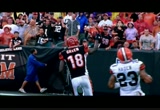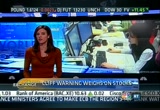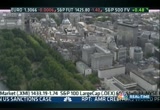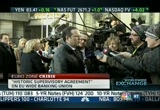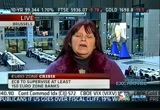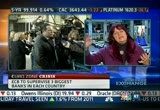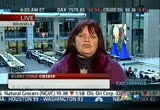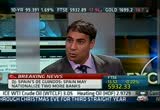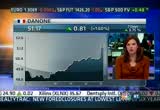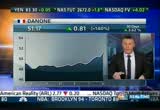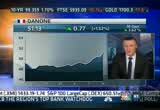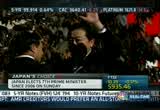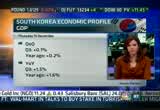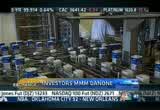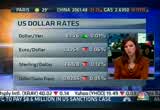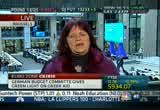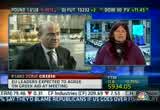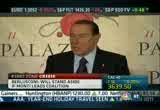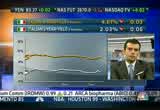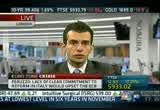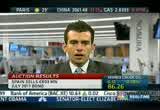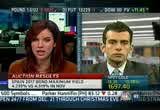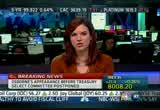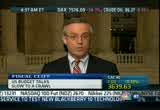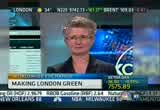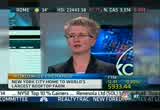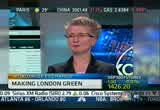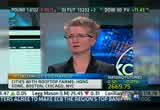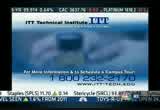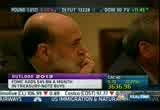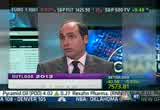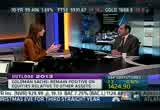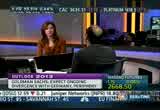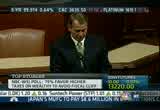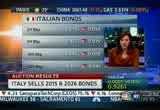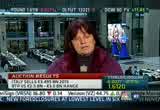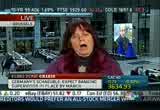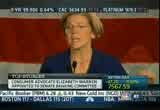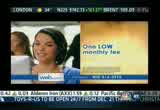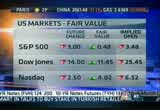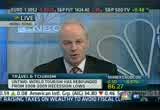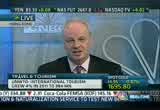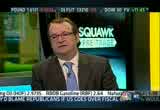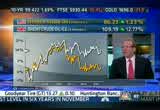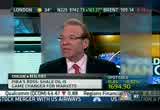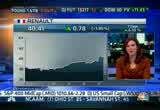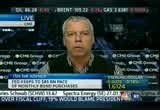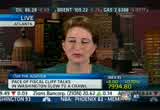tv Worldwide Exchange CNBC December 13, 2012 4:00am-6:00am EST
4:00 am
4:01 am
enough to offset the damage if the u.s. economy goes over the fiscal cliff. and the fed takes the new and surprising step in its ongoing efforts to boost the economy, tying interest rates directly to the u.s. unemployment rate. plus, investors cheering the plan to save danone's plans to offset losses over the next two years. >> announcer: you're watching "worldwide exchange," bringing you business news from around the globe. welcome to the program. coming up on today's show, we'll be plenty busy. we head out to tokyo where carry enjoji has been talking about the upcoming elections. then, we hone in on central london where one pilot project is living roof and major buildings. find out what green living can
4:02 am
do go r to improve the area. and today, the 1 billionth international tourist will reportedly arrive at a destination in the world. at 11:20 central time, we'll speak to the world travel council to find out why france is still the world's top destination but more money is spent in the u.s. and central america is now a star performer. first, we want to get the latest news. looking for confidence out of germany's ifo survey. if we can put it up on the screen, that would be a help as i'm working to get it up at the moment. as soon as we get the numbers on that front, i will bring them to you. looks like we're still waiting on that. in the meantime, send in your thoughts, questions and comments about the program to worldwide@cnbc.com. and the biggest news of the morning, we have a deal.
4:03 am
after 14 hours of talkes and months of negotiations, an agreement has been reached on a pan european banking supervisor. european finance ministers say they've drawn up plans to allow the ecb to directly supervisor the three largest banks in each country except for the uk and sweden which have both opted out. european leaders need to give their seal of approval and silvia wadhwa is in brussels with the latest. sylvia, it sounds like the meeting went into the late hours of the night. it sounds like the uk and sweden got their way. how significant is this agreement? >> the early hours of the morning. one may wonder whether that's good news for sweden and the uk that they opted out of the banking supervision or whether that's good news for them in that sense that they opted out and had their way. bottom line is, we have an agreement. that's the most important thing. otherwise, they threaten meetings going between the years leading up to christmas because
4:04 am
everybody agrees that we might have a type of agreement before the year is out. the agreement that is on the table, ecb will be the banking supervisor. the straightforward ecb supervisory council will be flanked by two other committees, a mediation committee and a steering committee. the personnel of this and the rotation principal of that yesterday to be decided. there were some sticky points and we'll move that into deep space. it's somewhat of a compromise into what banks are going to be compromised. germany only wanted the minimum, something like 30 banks across the area. the french wanted the maximum, all 6,000 banks and they reached a compromise which means around 150 of the bigger banking groups will be supervised directly by the ecb and the ecb can step in when and if it sees trouble.
4:05 am
nothing has been talked about, at least not to the decision-making process about the further, the next step. this is banking unit, this is deposit insurances and how this is going to work out. if the bank is being wound down, who pays for what, etcetera. so they've reached the minimum of the agreement that they needed to reach to get some banking supervisory law on the road. that should happen sometimes provided the heads of state sign up on it should be put on the road sometime in february/march the latest. then it would take up to a year for this to be operational. and to being in working order, so to speak. then, in the meantime, we can talk about how this banking union might work out in the long run. but my guess is it will take a long time yet before they reach an agreement on banking union because this agreement, this
4:06 am
minimal agreement but important agreement took many hard sessions to even wrestle out a compromise like this. so i think banking union is fine. >> silvia wadhwa, thank you very much for following that for us into the wee hours of the morning. joining us for more on what this means for the market is paris annan from fidelities investment. we wake up to this news. it's significant. as you look into 2013 and you start to look at why european equities are going in general, how does thi change if at all your views? >> well, when we think about the outlook for on 2013, you could almost separate it into two outlooks. you have the outlook for the macro economy and the politics in the euro crisis and the outlook for making money in the european shares. with things likes the eu banking supervision and even the change in italian politics, what we're
4:07 am
seeing more generally is that these events are having a more muted impact on markets more generally. so what we think is going to be the bigger factor will be actually what happens at the underlying company level in terms of driving markets. for that, we have a relatively lower output. >> and that's interesting. we have recession across the eurozone, maybe the growth outlook isn't great. but at the same time, people are growing more bullish on european equities. is it simply that you think the macro problems have bottomed out? >> clearly, we've had various events through the year, threw 2012, which has at least demonstrated a commitment by authorities in brussels to instill confidence in the banking sector and instill confidence in the euro. that has taken or removed one of the tail risks that really concerned people looking at the european markets. so that's enabled them to switch
4:08 am
the focus back on to the companies and appreciate the quality of companies that we have in europe and then the attractive valuations that they're trading on. >> to stick, though, with the news this morning, finally on that front, a banking union, clearly we need several important pieces in place for this banking union to come into being. among those most contentious and most important will be the worldwide deposit scheme. that seems to be, politically speaking, still if a far off into the future. so this lag time between the first step and what needs to happen, what happens in the interim? >> well, the way that i would think about something like this, one of these technocratic structures, is that a lot of their value just in the fact that they exist, they're able to create confidence and give people a sense that there's some supervision in the market. often, though, when you actually dig into the practical reality of what's going to happen and how these bodies are going to enact their powers, then the kind of more issues come about.
4:09 am
so i always feel that these kind of technocratic structures, they always end up being -- there are always issues and so is the practical applications of their powers. >> that's true. we always find in retrospect that that is the case. the federal reserve ramped up its asset purchases program. that was expected. but in a surprise move, the fed set out new thresholds on unemployment and inflation before it moves on interest rates. fed chief ben bernanke says changes will make the central bank more transparent adding that can only help markets. but he did also trying to play down the changes. >> the change in the form of the committee's foreign guidance does not in itself imply any change about the committee's expectations of the likely future path of the federal funds rate since the october meeting. in particular, the committee expects the stated threshold for unemployment will not be reached
4:10 am
until mid 2015. >> what's the impact of this move? a significant one, although at least in the near term a lot of it appears to have been priced in. >> absolutely. i think what we're seeing here with the bernanke statement is it effectively makinges andit a lot of things that have been implicit in terms of the way he's managed money policies since 2008. i think that one of the questions i would have is does having this visibility about monetary policy have the impact in terms of stimulating job growth that he might think? whereas, to my mind, visibility about fiscal policy is maybe more important in terms of driving growth looking forward. >> well, he actually underscored that, talking about the need to resolve fiscal cliff in the u.s. european investors, should they be concerned now? how many days do we have left before the end of the year that we don't have an agreement yet? >> i think should we be concerned? probably not really, i don't think. i think the outcome on in terms of the prospect for the u.s.
4:11 am
economy in the coming year could be impacted by what happens with the fiscal cliff, but i think some sort of arrangement will be made sooner rather than later. you're not going to feel the full impact of the fiscal cliff. what we're likely to see out of the u.s. is modest economic growth, maybe not as strong as some of the bulls had hoped for. >> but also not as weak as to derail its current path? >> yeah. >> now, i wanted to talk briefly about 2013. when it comes to equity outlook, what sectors do you like? any particular names that you would like? >> there's a handful of areas that we're focusing towards and a handful of areas that we're focusing away from. and if i start with sort of where we've got caution, i suppose we're cautious to sectors tightly linked to the government or linked to regulators. the governments have no money, therefore, cannot afford to pay
4:12 am
them too generously. with respect to regulators, regulators are fighting for credibility. so more likely to err on the side of caution. in terms of area where we're more positive, we're more positive on intellectually property rich companies that have the ability to mon size that. >> such as? >> such as if you think about s.a.p. and germany, the lead sg one of the leading erp companies. many companies around the world are looking to structure their businesses more effectively and toni vest in technology today is about investing in productivity tools. that's what sap can bring to many of its customers. and that kind of intellectual property is build up over decades so it's hard to replicate. these represent barriers to the unique assets that these companies have. >> and in 2013, will there be more differentiation?
4:13 am
>> i think there will be more differentiation within sectors looking forward to 2013 relative to what we saw in 2012. >> we'll leave it there. thanks for coming by. >> thank you. now let's look at market performance in asia. will i sixuan is with us. >> thank you, kelly. the fed easing was only able to get the boost to a few regional markets here. the nikkei is one outperformer. traders call this the abe trade as investors have been in a buying mood ahead of this sunday's election. the yen weakens to a near nine-month although against the chinese dollar. there could be some liquidity concerns this week.
4:14 am
financials and commodities plays were weaker. property developers outperformed as beijing is expected to highlight urban growth at the central economic meeting this weekend. meanwhile, shares in hong kong retreated by .25% weighed down by utility stocks. elsewhere, foreign investors having buying into the south korean market for the 11th straight session. the kospi ended higher after the bok helped rates study. in aud trail ya, the asx 200 ended flat. miners shined. defensives were black. back to you. >> let's take a look now at what's happening in markets across europe. kind of mixed trade. more decliners than advancers. some of the decliners include danone which is embarking on a cost cutting plan.
4:15 am
but the stoxx europe 600 broadly speaking down about .25%. the major bourses have been on a nice run over the last several trading sessions today. adding to that, the ftse up another .4%. we know the sell-off that we saw on monday and the monte/berlusconi news, now berlusconi might be indicating willingness to let monti govern. the xetra dax is lower this morning. the ftse 100, too, down about 0.2% respectively. take a look at the bond curve. spain, this will be a good proxy for now. we'll get the ten year for italy in just a second. 35.34% is the level there. u.s. benefiting from fund flows well. choppy trade across the picture
4:16 am
here. let's look at the italian curve before we get the results later today. we are seeing green across the board, so yields dipping before that probably has more to do with the political rhetoric we're seeing especially coming from berlusconi. under 4.6% for the ten-year and on the short and two, a bit of a rally. finally, let's close taking a look at the forex. euro/dollar is weaker. and it's holding just above 1.30. and the dollar/yen, this is the one sixuan mentioned to watch. heading into japanese elections, stocks outperform adding oots .1% to 83.35 this morning. south korea's central bank may be worried about factors in the economy, but the dok says the economy is stronger than it used to be. more on that next.
4:17 am
can i help you? i heard you guys can ship ground for less than the ups store. that's right. i've learned the only way to get a holiday deal is to camp out. you know we've been open all night. is this a trick to get my spot? [ male announcer ] break from the holiday stress. save on ground shat fedex .
4:19 am
4:20 am
cutting plan across europe over the next two years. the move comes in response to the eurozone crisis as austerity crisis continue to hit the country's bottom line. danone added managerial job cuts could be included in the plan. stephane is following this story out of paris. can workers at danone trust that they won't be affected? >> we don't have so much details at this stage. danone will present this plan to the company by march 2013. so in the next couple of weeks we should have a better idea about the plan. we just know that danone is going to reduce the number of manager necessary europe because the company has 9,000 managers in europe which it has too much according to the top management of danone. this was built in a growth environment, but the company needs to adjust the structure to the crisis in europe. europe is the main problem for
4:21 am
europe because if you look at the global face, danone was able to positive 1.1% for the first three months of the year excludeing europe. at the same time in europe, it was 0.6% contraction. that's a problem for danone, the economic crisis in europe. the company is facing increasing pressure from some of its shareholders include nelson phelps. he believes that the share price of danone has a significant growth potential, something like 60% over the next two years. which is much higher than the current share price where at 51 euros this morning. danone is trying to save 200 million euros. that's the only number we really know for sure at the moment and that's the main response to the
4:22 am
pressure from its shareholders. over to you. >> thanks very much. staying with france for just a second, the finance minister is commenting about the agreement that the euro group reached on the banking up. it's integrity is good for the agreement and as we focus on greece today, conditions are in place to disburse the next tranche of aid to greece totalling 43 billion euros. over to japan, voters are heading to the poll on sunday. the major indicators suggest a win for the opposition party. the local media says there is still a large pool of undecided japanese voters. kari enjoji has more on this report from tokyo. >> reporter: 12 parties, some less than a month ole are fielding 1,504 candidates. but instead of being slow for
4:23 am
choice, voters say i just don't know. polls suggest the prime minister's democratic party is unraveling, hinting that many first-time politicians that swept the party to a victory three years ago could be wiped out. >> it's quite possible that the cpj will sink from neing first or second but possibly to even third parties in japanese politics. >> the dpj's handling of the fukushima disaster and undelivered economic promises have alien ated many voters. if the liberal democratic party wins, shinzo abi could with the newest restoration governor. the emergence of these smaller
4:24 am
parties could mean a messy transition period. >> my gut feeling is that possibly no single party will win the single majority in the next election. this is democracy. eventually people will learn that stability is important. >> thousands have rallied for an end to nuclear power, an issue most dpj and lpd are reluctant to commit to. that's opened the field to new groups like the power part party of japan. >> from the perspective of somebody that has been coming to japan pore 30 years, it is moving. >> abe said he will increase defense spending if needed. it might be just talk ahead of an election, but abe was prime
4:25 am
minister in 2006. his first foreign trip was to beijing to try and mend fences as repeated trips, a true comeback analyst say would be if abe the campaigner were quite different from abe the leader. staying in the region now, nearby, the bank of korea has decided to keep interest rates on hold 2.75%. it was largely expected, but the next move isn't to easy to predict. cherry kang has more for us live from seoul. what are you hearing over there? >> this was the second straight month that the key rate is untouched. the bok tends to shy away from adjusting the key rate ahead of a presidential election which will be held next wednesday here in south korea, as well. now, so much for, say, this is
4:26 am
to give room for policy changes from the new president who will take the top office next february. plus, many observers are saying the bok may have wanted to wait it out to see the effects of two previous cuts of this year back in july and october. although domestic demand remains sluggish still capping spending here and companies are holding back on making new facility investment with the political uncertainty. november export data did show signs of improvement growing 3.9% on year. and that's exactly why, looking ahead, analysts are divided at this point over the next move with some saying a cut is expected in the first half of next year while others say, kelly, that it's likely to freeze the rate to allow growth and inflation. now back to you. >> thanks very much. let's see what francis chung
4:27 am
thinks, senior strategist at credit agricole. which way is the bank of korea headed from here? >> today it is pretty much in line with expectations. however, tweel, before that, we see the korean yuan edging up across the curve. inde indeed, recent data did point to some initial shine, offers stabilization in external nand. going forward, could potentially fit into positively for production. but over the indicators, recently they have been relatively maxed. so the bok want to wait and see and to better gauge the economic prospects fo fog forward. so overall, i think that they did the right thing. looking further ahead, i think they actually may not need to cut rates further. >> why is that, francis?
4:28 am
is that because you see signs of strength in the korean economy? >> right. if you look at inflation, well below the lower end of the new target for next year. if needed, the bok would have a new way to cut interest rates. however, our base case scenario is for the recoveries in the u.s. to be the same, to pull itself out from the mild economic contraction this year. and the chinese economy has already bottomed out, so looking ahead, it seems that the external environment is turning better for korea. so that may mean that the bok is done with the current easing cycle. >> well win wonder in light of some of thetics in the region whether it has to do with north korea whose successful missile launch we just saw, whether the elections coming up,
4:29 am
if the central bank doesn't perhaps want to maintain a relatively easy stance or at least leave that option open should the economy suffer any resulting hit into next year. >> of course i think the option is always open, especially when external uncertainty is always high. the election is a very good point in keeping the central bank from cutting or even hiking rates at the current juncture because the two candidates are still running neck and neck, which means that the uncertainty is very high as to the outcome of the election. and in terms of the geopolitics, i can it has been there that the bok may want be able to actually react to that very aggressively. >> francis, finally, i don't know if this is outside your coverage area, but i know there are a lot of investors looking to the korean juan as an overput vp performer next year. but that would imply that the bank of korea doesn't have any more to do as you've indicated.
4:30 am
currency appreciation, is that still in the cards? >> right, actually, korean yuan is not among one of our top picks for next year. korea is still likely to maintain a current account surplus. and, of course, not cutting interest rates cannot just support the one from a huge potential perspective, although that is not the most important factor. but added to the current account surplus, i would say we expect continued inflows into the korean bond markets and indeed especially the sovereign bond which has been a very faithful candidate for foreign investors including foreign central banks to diversify their portfolios. we have been seeing investors from china, southeast asia or from as far as the u.s., norway, etcetera in buying korean won bonds and most likely these are from the sector due to their
4:31 am
diversification needs and attracted by the korean bond markets. and if you look at the yields, although it has already come lower quite a lot, but if you compared that with treasury yields, that is very attractive. >> we'll leave it there. thank you very much. now if you're just joining us here on "worldwide exchange," these are your headlines. a union at last. the eu finance ministers hand the ecb the power to supervisor more than 150 banks following another late nightmare thon session in brussels. the euro bounces on the news, but stocks in europe trade lower as ben bernanke warns monetary policy may not be enough to offset the damage if the u.s. goes over the fiscal cliff. and the u.s. takes another surprising step tying interest rates to the u.s. unemployment rate. plus, investors chairing danone plan to save $2 million over the next two years as they
4:32 am
4:35 am
welcome back to "worldwide exchange." we're checking on trade now. european markets for the most part dripping lower. ftse 100, cac 40 down less than .2%. xetra dax down more than 0.4%. double digit gains for the other major bourses, as well. we've seen gains the last several trading sessions. the ibex 35, rallying up .5%. same for the ftse mib. speaking of italy, let's take a look at the yield curve. 4.64%. italy has a dead auction coming up later in the show. as for spain and germany, they are seeing yields drip lower this morning, as well. back across the board, the guilt down 1.82%. the euro/dollar was barely
4:36 am
weaker the last time we checked and now it's drifting a little further. 1.3064. it's still above that level. and the dollar/yen now receding to almost flat if not a little lower on the morning. now european leaders are expected to agree on the next tranche of aid for greece when they meet today. sylvia is in brussels to follow aus of these negotiations for us. sylvia, a torturous route for greece. are they finally going to get this money? if so, what does that change. >> well, it at least gives them a bit of breathing space. it doesn't change anything in terms of the overall dismal situation of the country. there was a letter of the german finance minister yesterday, written so it is by one of the deputies to the german bundes stock where he basically said, we are ready to sign up the next
4:37 am
package for greece. this has not been confirmed or denied by the finance ministry, so it seems that that's the determination. it looks like it, anyway. we know that the one linchpin is indeed the set buyback program. it kind of falls short of expectations. but i'm sure they're going to make it enough of a success to sign the check tonight or tomorrow if it's the heads of state doing it. but the expectations that the euro group meeting that is in session right now is the one that will dispense the money or will decide to disexpense the money. never mind who signs on the bottom line and indeed the great delegation goes home at least tomorrow saying, okay, we've got the next step along the road. it hasn't changed much of the baseline scenario, but if you look at where we were with the yield spreads across europe, it certainly doesn't look as cripple as it looked maybe six or eight weeks ago. the greater part of that, no doubt, is the announcement of the ecb to launch its omt
4:38 am
program, but we all know sometimes tomorrow never comes. so far, omt hasn't been activated and doesn't look as if it's going to do in the nearest future. so a bit of a breather. whether there's more remain toes be seen. >> silvia wadhwa for us from brussel peps. now, both italy and spain are testing the market again today. both countries are set to auction off a range of medium and long-term debt. this comes after italy sold short-term paper and mario monti announced his discussion to step down. today's auction will see italy settle its funding targets for the year. sylvia berlusconi appears to be endorsing mario monti. speaking at a press conference in rome, he said he would give up his ambitions to run if monti ran as the central coalition. he then went on to say he still plan toes run for office. he also said bond spreads were a, quote, hoke, that the euro
4:39 am
was not a true currency since there was no central bank willing to print money like they do in japan. meanwhile, moody's says that the political turmoil in italy will have little impact on the country aes sovereign debt rating. our next guest disagrees and says he sees repricing of debt in italy. he's sylvia peruso. why are you concerned about moody's taking action here in italy? >> good morning. i think italy has a number of big challenges next year. as you can see, the market remains extremely sensitive to the fluid political landscape at the moment. but most people see it as a significant growth challenge with which the market will have to reconsider a bit of trajectory as to the fiscal consolidation path and the extent to which the world nation
4:40 am
will work next year which may trigger some repricing of the risk for the sovereign which at the moment is substantial of the ecb's intervention. >> that and market sentiment has gotten more positive on sentiment late lit. if people come around to the risks that you're outlining, how much of a reaction are we going to see in yields? >> yes. obviously, the ecb's announcement is very important and the event has a number of events materializing. i'm pretty sure that the short kind of the curve in italy will not get the sort of level that we've seen in the worst of the crisis. but at the same time, i think there are a number of issues which will create some tensions
4:41 am
and the policy response does not protest on the curve in terms of interest rates for the italian bond market. i think the departure of monti leaves a question. i think next year, renewed -- obviously, the fact that the country may be debating to get a bailout program from the european partners, not that this is necessarily something negative. i think we need to keep this in mind. it's potentially a way to lock in some stable cost of standing, at least for some period of time, that will certainly if a sill take the budgetary execution, but also, i think through the private sector stabilizing the cost of timing there, as well. >> sylvio, stay in respect we
4:42 am
want to come back out to you in just a couple minutes time. in the meantime, german prosecutors say they're investigating 25 deutsche staff on money laundering and obstruction of justice. police raided the bank's headquarters yesterday. do you have ya bank says these searches relate to ongoing investigations over tax revacation and the trading of ceo2 trading certificates. two board members are involved in the investigate. barclay's looks set to become the latest bank to cut jobs at its investment banking unit. according to the "wall street journal," as many as 2,000 jobs are set to go as part of a restructuring plans. the cuts will be announced early next year. and in australia, grain corp. says it's sweetened $2.9 billion bid for archer daniels midland is still not enough --
4:43 am
by archer daniels that should be. there could be another offer, but it's unlikely to be higher than what's already on the table. the two companies are keeping their lines of communication open. check in on shares on the news, grain corp. shares down about .6%. archer daniels yesterday in the u.s. higher by about .2%. in japan, a couple of big banks are making moves into the asia. ono-san. >> hi. the bank of tokyo mitsubishi is set to buy a 20% stake in vietnam's second largest bank. the vietnamese government around $720 million for the shares in the first half of next year. funding requirements are rising in emerging asian countries. tokyo mitsubishi wants to expand its profit in the region by 50%
4:44 am
in the next three years and this deal with just one part of its plan. it's already formed alliances with banks in indonesia, myanmar and is looking in thailand and india for new partners. asia, especially southeast asia is an emerging hot market for other japanese lenders, too. mizuho will set up firms which set up shop in laos given its labor costs and low political risks compared to china. now let's get you the latest results of spain's auction debt. the country is seeing lower yields than the last time it went to market and higher demand. 2015's bid to ratio, 4.8 versus 2 the last one, 3.1 versus 2.6
4:45 am
for the 2017 and the 2040 saw a 2.1 bid to cover. of course, when it comes to the yield, i would give you a sense of what we're seeing on these. 2015 maximum yield coming in just under 3.43%. that's roughly where we stood on the last go around on december 5th. for the 2017, we saw 4.24 versus 4.5, so an improvement. for the 2045 .9 the%. backing up quite a bit relative to the 4.8%. although the last time we saw an auction there was in march 2009. to walk us all through this, let's get back to sylvia peruzzo from nomura. what's your reaction? >> i think we need to take stock of the fact that the cost of funding for spab has improved substantially.
4:46 am
we need, i think, to consider a situation where going into next year, the supply will continue to remain high and most importantly, i think, we need to make an observation about what the state of the real economy of the private sector. because while the sovereign is certainly improving at the moment, due to the policy announcement, our main constant relates the cost of funding or the real economy, which to some extent is linked to a number of other factors which will southern bond market cannot stabilize. in fact, if we go as far as saying that the escalation itself potentially may not solve the problem of the spanish real economy. we expect that some of these debate to come into next year when the economic outlook may worsen compared to expectations. >> certainly it may not solve any problems, but i keep coming back to this, the bid to cover
4:47 am
ratio for the three years, 4.8%, that's pretty high. maybe perhaps it tells you more bin investors than it does about the health of spain at this point? >> absolutely. we've done some work in terms of pinning down exactly ws happening in terms of flow and capital in and out of spain and the observations that we're seeing corroborate the fact that since september, the reasoning flow of portfolio investments but also of generally of interest from investors which are coming into spain. we don't know what the breakdown is in terms of domestic versus foreign participation, but the information that i was sharing with you is indicative of the fact that certainly the news about spain in the short-term has changed. and so i'm not surprised about this result and i would expect that if the bond market continues to remain, we will see more in terms of foreign investors coming back. >> we'll leave it there.
4:48 am
4:51 am
welcome back to the program. george osborne was due to appear before the treasury select committee this morning. however, it's been confirmed the hearing has been postponed because, yes, he was delayed in brussels overnight for those extended talks on the banking union. time apparently that paid off as the uk did manage to get some of what it was looking for in those negotiations. over to the in us u.s. now, lawmakers may not want to book travel plans for their christmas holidays as budget talks have slowed to a crawl. ayman has more from capitol hill. >> good morning, guys. not a lot of progress on wednesday on capitol hill. we had a press conference from speaker of the house john boehner. he doesn't sound all that optimistic the. >> i remain the most optimistic person in thoun, but we've got some serious differences. >> also on wednesday, jpmorgan
4:52 am
ceo jamie dimon said that the economy, if washington can get a deal here is poised to rocket. >> the table is set very little right now. small business in good shape. 5 million more people working than four years ago. housing has turned the corner. let's just keep it going. >> so what were they doing up here on capitol hill? well, they're holding duelling press conferences with images for the tv cameras, one of a group of adorable young children and another one using a santa claus here, everybody trying to make their point, everybody trying to grab the camera's attention, but not a lot of negotiating progress here, at least in public. that's where we stand for now. >> eamon there from washington with the latest. here in central london, it's about to get a lot greener. urban farming is coming to london rooftops. the gardens will be sustainable, bringing the produce grown on top of the office buildings in london and modeling systems already in place in new york and hong kong.
4:53 am
joining us now with more details, pasmovoro gordoto. thank you. >> midtown lopped has a new project pilot system where you'll see not just, what, four buildings where they're using the roofs for agriculture, but because they're trying to fully recycle what's up there and make these closed systems. >> that's right. we've got four rooftop pilot projects and more in the pipeline and potentially innovative projects that could be rolled out through central london. what's the cost? >> as a pilot, it's about 35k. going forward, it stands to save around 10% of energy usage and, obviously, cut emissions by 10%, as well. >> so 35 pounds apiece. how long does it take usually for that to recoup that cost? >> it wouldn't take long at all. if you think about it, we've got large corporate in central london burning vast amounts of
4:54 am
energy. we've got a lot of historic buildings that's quite hard to green. so the impact of a green roof has fantastic insulation qualities. >> i think actually nbc is in central london. cnbc is here, but nbc will be part of the studios. i don't know if they have anything planned, but if the cost sounds relatively low, why do you think more haven't signed up for this? >> i think they will. i think it's fairly new to london and we're doing it in a fairly radical way by growing produce as opposed to having a green grassy rooftop. we like the idea of solutions getting involved. i think when you grow food, it's more human scale, it's something everyone can get involved in. so employee morale, employee retenti retention, getting that message out to the greener and more energy efficient is always good. >> i wonder if there's some pushback about recycling waste into the rooftops and having to use what's grown there.
4:55 am
people aren't still a little bit put off by all that. >> i think today people are much more open to it and i think it is about getting involved. we tend to do a lot of recycling at home or gardening or look at local communities at home in a sort of way that people want to get involved. i think it's time we did that in the workplace, as well. >> and you mentioned this happening in other cities, including new york. >> absolute lit. if all the rooftops in chicago were green, they would say around a million pounds of energy per year. in london, if we look at the scale of things, we're looking at 2 million. >> and we're showing the highlight in new york, this being one example of a rooftop park. one issue it seems is trying to figure out whether to impose this from the top down or let individual companies and businesses come around on their own. do you get the sense there's some momentum or transaction here or would you prefer to see this imposed on them, so to speak? >> oh, i think people have to want it and generally get involved. but sometimes it's about knowing what the benefits are and
4:56 am
actually understanding it. i think in terms of cutting energy footprints, that's going to be good and, obviously, something that government is pushing quite hard. so like it or not, i think sooner or later, people will have to get engaged. >> and we just hope it doesn't throw santa off too much when he sees that. thank you very much. >> thank you. new york's madison square garden was the central of the rock and roll universe last night as a star-studded lineup played a concert for the victims of hurricane sanity. the show was telecast live, stream cast, shown in theaters world wooitd. estimated 2 billion people were able to see the concert. if you missed it, here is a small taste from the who. ♪
4:57 am
♪ are you ♪ who are you ♪ who are you >> proceeds and donations during the show will go directly to the robin hood relief fund to distribute the money throughout the region. more than $30 million was raise just for ticket sales alone. shares here at hmv lost more of a third of their value while investors dumped the stock. 36% down, look at that.. hmv said tough market conditions led to uncertainties for the business, but tried to reassure investors it is in negotiations with banks. still to come on the show, we'll speak to one who says european equities should get into investments next year. having you ship my gifts couldn't be easier.
4:58 am
5:00 am
5:01 am
policy may not be enough to offset the damage if the u.s. economy goes over the fiscal cliff. and the fed takes a surprising step in its ongoing effort to boost the economy tying interest rates directly to the u.s. unemployment rate. let's check in on u.s. futures now as we chair up for the start of the trading session. yesterday they closed pretty much lower after rising initially after that federal reserve meeting and giving back gains throughout the session helped by news elizabeth warn will be on the banking committee. but for now, the dow jones industrial average is trying to add -- no, that is subtract about 12 points if you take fair value into account this morning. the nasdaq and the s&p 500 are lower, too. take a quick look at the ftse global cnbc 300 which is
5:02 am
marginally positive, 0.05%. but the better tone of the asian trading session has been muted by what's happening in europe. we can look at the major bourses. the ftse mib and ibex are rallying. ibex is over the 8,000 level. in germany, the xetra dax is shedding .5% and the ftse 100 is lower, as well. taking a look at the auctions today, spain went to market and it saw quite a bit of demand especially for the shorter end of its paper. the three-year with the bid to cover 4.8 on that one. and we're seeing prices continue to rally, not just in spain, but pretty much across the major sovereign debt markets as a result. italy, which we'll be shortly hearing from in terms of the bonds it's trying to close out its target for the year is consistent with that move. prices are up a little bit. yields falling. the 1110-year mark, 4.64%.
5:03 am
quick check off borex, the euro/dollar was weaker the last time we checked. now down 0.07%. still above 1.30, 1.3064. but it has been giving up its earlier position. the main focus here for investors is just how weak that yen might go as elections in japan approach. for more on what's happening in asia, li sixuan joins us from asia. >> hi, kelly. the easing only managed to give a lift to a few regional markets here. l long which the nikkei had another impressive session. the index has surged more than 10% over the past month on what traders called the abe trade. the yen weakened to a nine-month although against the dollar
5:04 am
ahead of this sunday's election. there could be some liquidity concerns this week. but property developers outperformed. mean wile, weakness brought the seconder to a new two-year high. for investors have been buying into the south korean market for the 11th straight session. in australia, the asx 200 ended flat. miners shined but defensive sectors lost steam. agency expected, the fomc has ramped up its purchases program. they set ow new levels of tlefl hold on uninflation before it moves on interest rates.
5:05 am
fed chief ben bernanke says the changes will make the central bank more trabs parent, but ultimately he did try to play down the changes. >> the change in the form of the committee's forward guidance does not in itself imply any change in the committee's expectations about the likely future path of the federal funds rate since the october meeting. in particular, the committee expects the stated threshold for unemployment will not be reached before mid 2015 and projects that inflation will remain close to 2% over that period. >> as investors prepare to head home for the long christmas holiday, we're taking a look at what's in store for markets in the new year. european equities, that's the call for our next guest. he says the stoxx 600 could return more than 7% despite ongoing stagnation in the euro area. peter, welcome. >> thank you. >> why are you so bullish on europe, despite the weak macro fths. >> let's just say first of all we have a contractive view about equities generally. but europe, as well, we think
5:06 am
will perform strongly. because the valuations are still supportive and despite the stagnation in the economy in the eurozone, we expect profits to grow through next year. >> it's remarkable because this year, every time i check in and look at the dax year-to-date, it's up 26%, almost 30%, how much more can it really run? which areas, which bourses, which sectors do you really see driving the rally in 2013? >> well, of course, the european markets have been led by a strong germany, but the overall stoxx 600 has outperformed the u.s. this year because of the attractive valuation, i think. in terms of exposure, we generally prefer companies with high yields and strong balance sheets. but we like growth parts of market because growth is scarce and that leads us to things like luxury goods, to autos, to insurance and media. at some of the sectors that we think will outperform through
5:07 am
the course of next year. >> and what is it that's supporting that profitability outlook. it would seem if anything that that's the one area where investors have a lot of concern. >> well, at the beginning of this year, the consensus was that profits would grow in europe through 2012. we believe that they would fall and indeed through the course of this year, expectations have collapsed. profits have fallen, despite that equities have done well and are supported by attractive valuation. now, next year, although the eurozone economy is stag nating, we expect a global economy recovery it's that recovery in the global back drop that gives some top line growth and overall profit growth we think is around 9%. >> wow. i wonder, too, how much of this is fund flow. so if you were to look at two other factors, you have the ecb doing everything it can to reassure investors that this project will hang together, that
5:08 am
they don't necessarily have to worry about currency risk. also, we're seeing such strong demand for credit. so is that the not helping to push that next investors into the stock market? >> well, so far, there's been a real absence of net flows going into the ft market, particularly in europe. so equities have become almost an all fanastic class. but as connectivity comes into the central bank action and there's little value left in fixed income markets and even credit, equities will benefit i think by default. there would be an increase for commodities next year. also, corporates themselves will be sensized to buy back stocks because the cost of equity is so high relative to the cost of debt. >> what's at the top, by the way? >> the top market is the topix where we expect strong returns, 20%. quite loaded towards the first half of the year, very dependant
5:09 am
on further policy easing, but if that comes through and there's more of an inflation target, then the equity market there is very happy on an asset basis. >> and the underperformers? >> well, we think that latin america will be relatively weak and the u.s. why we think will do quite well because it's already more fully valued than other equity markets. we have it at the lower end of the pecking order for the developed markets next year. >> all right. you heard it all from peter. thank you very much for your time this morning. >> thank you. >> no progress is being made in the budget talks in washington as congress and the white house try to reach a deal to avoid the fiscal cliff. house speaker john boehner is telling republicans that talks to run through the holidays and not to make any christmas plans. 75% of americans would accept raising taxes on the wealthy as president obama is demanding. if the u.s. does go over the fiscal cliff, more would blame
5:10 am
republicans than the president, although 56% say they would equally apportion the blame. let's take a quick look at what's on the agenda for the u.s. jobly claims are expected to show a small gain. retail sales and prices. the core scloeding autos slightly lower on the month. producer prices are seen falling .5%. for the core there, inching up when you exclude food and energy. at 10:00 a.m., we include business inventories. plenty to keep investors butsy today. and the results of italy's latest debt auction are due next. just how confident are investors? we'll find out when we come back. and we can save you 10% on ground shipping over the ups store. look this isn't my first christmas. these deals all sgreaat t. but later... [ shirt ] merry christmas, everybody! not so much. ho ho ho! this isn't that kind of deal. [ male announcer ] break from the holiday stress. on ground shipping at fedex office.
5:13 am
houston, we have a deal. after 14 hours worth of talkes and months of negotiations, an agreement has finally been reached on a pan european banking supervisor. european finance ministers say they have drawn up plans to allow the ecb to oversee the largest banks in the country, except for the uk and sweden which have opted out. now, the latest results from italy's debt auction. italy is coming to market with a three-year bond.
5:14 am
it's yields the lowest since october 2010. it also sold about just at the high end of the range it was looking for, about 3.5 billion euros worth of debt. just to recap what we're seeing, the december 2015 btp yield, 2.5%, a low bid to cover ratio under 1.4%. but we're seeing yields there, 2.64%. sold that at the high end, 750 million euros worth looking for the yield on that one. and as soon as i see it, we'll send it along. 4.75%. down from 5.32% in september. for plenty more on this and how it all fits in on the banking union, let's get straight out to silvia wadhwa in brussels this morning. sylvia, a vote of confidence by investors. is it warranted? >> well, that's, of course, as always, a big question. if you look at capital flows,
5:15 am
what you hear from the big investors, the big institutions in the u.s., we have begun to see some reflux into the eurozone into various countries and not only into the safe haven into germany. and that is something that we've seen for some weeks. and the sort of little steps news that we get out of the eurozone seem to support that. first, we have the almost -- the debt buyback from what everybody says was successful. whether it's short of expectations or not, it doesn't matter at this point. the fact is that it will be sold as a success and the money will be signed over to greece very -- 199% certainly today. the latest at the leaders meeting tomorrow. the next thing is, of course, now the deal on banking supervision. we've got the basic framework in place. yes, it might be the minimum concerns as we've let all the tricky bits out, the steering
5:16 am
committee, the advisory panel, certainly anything on banking union and deposit insurance, etcetera. but the basic key cornerstones are in place. the law will probably be put on track in january, february, march. and then that train will move ahead. and that is a bit of the vote of confidence we've seen in the markets here. >> sylvia, it's interesting. we are seeing a lot of vague areas here even in what was agreed to last night. for example, it's on clear who was trying to get what. so germany wanted its bank to be still under a national regulator and so the rules say that the ebc will directly supervisor banks with assets over 330 billion euros or which have assets to a fifth of their home country's output or if they're the three biggest banks in each member state. what i love is they say while the uk and sweden were trying to maintain sovereignty on this issue, countries outside the euro area are free to join the
5:17 am
supervision scheme. none yet have committed to doing so. how important is it that we hammer down exactly what is going to be involved here and do it soon? >> well, none have is 00% committed in doing so, except the uk and sweden. the others have indicated that they will look into it and there's the expectation they will join. maybe not immediately, maybe somewhere down the road. but at least they want to join. it remains to be seen whether they can join from the word go. in terms of which banks are being supervised, i think this is a typical eu compromise and maybe not a bad one. remember, france wanted all 6,000 banks being supervised. the germans said only 30 or so. we ended up with something closer to 150. and the option for the ecb pinpoint ago problem, even if it's the smaller banks saying, we have a problem there. we have to pull that into our supervision, they can do that. that seems to be the provision
5:18 am
that we have here at the moment. so i think everybody could be out there and say, we won a little bit and that's how eu decisions usually work. you have to end up in a consensus that everybody can live with and at least we get a law that deserve tess name on track and then it could become operational in terms of eu ba banking supervision early 2014. that's the earliest time frame we have for this. but at least the train is moving, even slowly. >> that's true. and we'll also keep an eye on bank stocks >> troy: today to see how they're gauging the fallout from this decision. >> silvia wadhwa, thank you very much. another story that could impact banking stocks today, elizabeth warren has a new assignment. the massachusetts democrat has been appointed to the senate banking committee, giving her a platform to oversee banking regulations. many on wall street have criticized warren who has called for the break-up of the big banks. she's expected to fight republican efforts to water down financial reforms in the
5:19 am
dodd-frank law. warren, a harvard law professor is the architect of the new financial consumer prekdz bureau, that news out yesterday, some citing it for a bit of a sell-off late in the market. eu finance ministers give the ecb the green light to oversee more than 150 banks under new banking union plans. spain sees good demand at its final debt aukz of the year, but analysts warn the strong results may be due to the small amount of paper on offer. and the fed takes a new step in its efforts to boost the economy, tying interest rates directly to the u.s. unemployment rate. still to come on the show, the world's billionth international tourist will reportedly arrive some today. where are the world's top destinationes and how much are tourists spending? nor when we come back.
5:22 am
welcome back to the program. u.s. futures are pointed lower this morning. dow looking to shed about 25 point to the open, about 4 for the s&p and 6 or 7 for the nasdaq. yesterday saw the trading session with the initial positive response. today, the question will be to whether there's reaction in bank stocks after that news that elizabeth warren is appointed to
5:23 am
the snooed senate banking committee. the world's billionth tourist will apparently arrive at an international destination today. this has made tourism contribute to 9% of the gdp and account for one out of every nine jobs worldwide. joining us now is david scoutville. david, first of all, how do you know the 1 billionth tourist is out there today and where might he or she arrive? >> it's impossible to tell where that personal is going to arrive. but we've calculated very precisely today is the day that ta 1 billionth tourist is going to cross an international border. as you said in your introduction, there's auto huge increase since travel started. only four years ago, that figure was 445 million. so that figure is growing quickly. >> one of the questions, though,
5:24 am
become what are the tourism hot spots? are we seeing a shift to where people are going, how they're traveling? what is the outlook for 2013, in your view? >> 2012 will finish at a growth about 2.12%. as we go into 2013, it will be about the same sort of growth rate. most of the growth is coming in asia. europe is still by far the biggest inbound and outbound market. most of the future growth is coming out of china. it is a market which is exploding. i think in 2010, they had 58 million people leaving china. it was 72 million last year. it will be about 80 million by the end of in year. it's all the product of lots of new people coming into the middle class and wanting to travel for the first time. and this is one destination that would use a lot of world visitors spending their money. is it still as appealing? >> yes. europe is never going to lose
5:25 am
its appeal. certainly visitors from asia want to come and visit europe. i think the europe outbound market is a bit sluggish at the moment. but it is still the case that people want to travel. and families will make a lot of sacrifices. they might not change a car, but they will absolutely protect their family holiday. europe will still grow, despite the economic difficulties. >> i also wonder when we saw the cost of airfare come down, when we've seen incomes rise, do you expect the rapid, rapid growth that we've seen to continue or is it market now maturing? >> no, the market is not maturing. the industry has grown on average 4% year on year. with the exception of cat slis mick things such as sars in
5:26 am
and 9/11. what will happen over the next ten years, there will be more of a shift to asia, particularly china and southeast asia where, as i said, more and more people are hitting the middle class and wanting to spend money and travel for the first time. >> we will leave it there. david, thank you and if you are that 1 billion tourist wes let us know who you are and where you're showing up. now, new york's madison square garden was the center of the rock and roll universe last night as the lineup played a convert for the benefit of hurricane sandy victims. producers say an estimated 2 billion people were able to see the show. the cast of artists includes bruce springsteen, paul mccartney, alicia keys and kanye west. if you missed it, here is a small taste from new jersey
5:27 am
native bon jovi. ♪ coming and they go their separate ways ♪ ♪ can't you tell from that final day ♪ ♪ and it's going on all you do is drink snodz ♪ i'm a cowboy >> proceeds made directly from the show will go to the robin hood fund which will be distributed to people throughout the region. perhaps a model of more things to come. stim to come on this program, could shale energy be the key to america's economic future? find out why right after this.
5:30 am
5:31 am
auctions. the last ones of the year. analysts warn the results could be viewed by the small amount of paper on offer. u.s. futures are drifting lower this morning as we continue to check in on the trading session. the dow jones industrial average now looking to shed about 13 points. for the most part, closing marginally lower on the day. we'll keep an eye on the reaction as the markets open up this morning. the ftse cnbc global 300 gives us a sense of what's happening overnight. broadly speaking, 0.2%, so just barely higher. we have of course seen gains pulling back a little bit here
5:32 am
as european trade has gotten under way. european markets, we're seeing red pretty much across the board. the ftse 100 shedding .3%. 5930 is the level there. the xetra dax down .2%. and iex here in spain, which was one of the outperformers this morning, up by nearly .5% has slipped negative. 7982 is the level there. so that stronger debt auction, as mentioned, not doing enough to spur sentiment when it comes to equity investors. how do you make money in these kinds of markets? here is what some of our guests have been telling us all morning. >> i can see it's a good short against the back drop of currencies, like the euro, the auss aussie. even currencies like the swiss franc. >> i think, you know, you do have to be in equities. and there's still minage in some of the highest equity markets which have only just started to
5:33 am
come to pass after two years of consolidation. i think that's quite exceptional. >> if you really dig into the different subsets, there's tremendous value. if you go back to the emerging market debt, for example, pretty good cycle that has been going on. and it's probably going to go on for a couple of years. and there's plenty to be had. very good returns to be had. and also can take higher risks, then the loss of currency are fantastic ideas to think about. >> the world's largest steelmaker is sounding bullish on the united states, saying the recent shale energy boom is poised to jump start the economy. he's much more optimistic on america than he was just two years ago, largely due to the benefits of cheaper energy. and jpmorgan ceo jamie dimon has weighed in on the potential for shale to transform the u.s.
5:34 am
economy. in an interview with cnbc, he said america had been granted another chance to reset its energy policy. >> we didn't have a great energy policy. we're importing 50%, 60% of oil from overseas, some from places where they want to kill us. so it's a bad deal. and now, we're given another chance. that chance is unbelievable. exxon, the united states, like 2025, we're going to be energy self-sufficient in coal -- i mean oil and natural gas. that will make america more competitive, it will reduce the deficit, reduce the pressure. let's do it wisely. >> and in just the last few minutes, the opec secretary said he doesn't see any threat from u.s. shale product, this after the uae minister has suggested a response from the oil ministers in vienna.
5:35 am
gary ross, welcome. >> nice to be here. >> the shale revolution in the u.s., is it a game changer as much as we're hearing from jamie dimon, arcelormittal? do you think this is going to make the u.s. energy independent, almost? >> well, we think it is. it's huge. we've statemented about 11110 billion pounds of recovery oil from shale crude. u.s. product will be going up overall, about a million barrels a day in 2013. about 65% of it will be shale crude. and it will continue to grow. >> people should understand we're not just talking about gas. we're talking about methods that's right.extract more oil. gas is clearly surplus. we're going to have l&g exports in the united states. we have a long-term growth phenomenon for natural gas. what people don't realize is how huge the oil is. when we talk about $110 billion of recovered oil, that's on 7.5%
5:36 am
recovery rate. the resource itself is huge. it's not just the united states. it's all over the world. it's just that the united states has the technology, the environmental policy which has allowed it to be pursued, has the individual rights in terms of some people going on to property. >> essentially we're seeing other parts of the world, as you said, recognizing impact. jerl today, britain lifted its shale gas ban, although it did impose stricter rules. so coming around to recognition at least as to what transformer powered this hole. >> it's definitely crazy. there's huge potential. so this is a game changer. now, in the oil market, you have to keep in mind, some 2 million barrels a day is being kept off the market by political circumstance, whether it be the iranian sanctions, syrian problems, sudan. this is a huge factor and that's it's to $1110 a barrel. >> what's interesting, yesterday we had a strategist on from shale and said their outlook
5:37 am
includes pointing in the right direction to go to $140 a barrel next year and that wti, partly because of this revolution, could fall to 50. >> i doubt that very much. ir mean, i can see -- and i doubt that present will be 140. which is a possibility. i think obama, president obama is going to offer them a grand plan sometime early in the first quarter. if they accept it, then prices will go lower. >> because of this revolution, how far do you think it's going to go? >> as of this risk, it's probably down to $1.99 a brand. >> and wti? >> with the pipelines coming on in the first half of 2013, wti is going to reconnect the global market. brent was 9$90, $95. it will only be something like $8 below that. >> that's interesting because that wide, wide gapt is implied perhaps by -- or that people have been playing at least and we've gotten close to $30.
5:38 am
what you're saying is finally the infrastructure is in place so that wti isn't trapped in the u.s. any longer. >> maybe it's a structure starting up in january. you're going to see the pipeline expansion, january start up and then you're going to have other pipeline expanses, not just from curbing, but from midland, texas. they are debottlenecking. but by the second half of the year, we think wti will be back, discounted somewhat relative to world prices because it's inland relative to costal markets. but still, wti is reconnected to markets. >> u.s., a net exporter of oil? >> eventually. we're talking about 2025, 2030, no one would have thought of this three or four years ago. the bottom line is, price works. and yes, we have set a higher floor price because shell crude recovers 60$60, $70, even $90 i some cases. we're going to tap this because we have the ability to tap it
5:39 am
and the technology and the right kind of economic setting and political setting to tap into this huge resource. >> fascinating. we'll leave it there, dr. gary ross. thank you so much for coming by. appreciate it. i want to quickly mention what's happening over here with regard to italy. bersani, leader of the party that could potentially take over those elections next year is out with a couple of comments this morning. he's saying monti, that is mario monti, could give us a hand with markets that first moves in any government would regard civic issues that beryl scone neeps ae goal is to distract the public, that italy needs even more reforms than monti's. he the italy anticipate left party and is trying to cast his policy very much with outgoing mario monti is doing calling berlusconi a distraction. and monti suggesting that he is
5:40 am
right. now, reynolds shares get a jump start as the carmaker gets a boost from volvo. find out more about that when we come back. can i help you? i heard you guys can ship ground for less than the ups store. that's right. i've learned the only way to get a holiday deal is to camp out. you know we've been open all night. is this a trick to get my spot? [ male announcer ] break from the holiday stress. save on ground shipping at fedex office.
5:43 am
higher after the french carmaker said it's raising around 1.5 billion euros to the through the sale of its 6.5% stake in sweden's volvo. stephane pedrazzi is following the latest for us from paris. what does this mean for volvo? what are you hearing? >> well, it means for renault, because the timing itself is surprising. although the divestment is not a big surprise. renault sold a 15% stake in volvo trucks two years ago and it was no secret that at some point the french carmaker would sell all its stake in volvo truck. renault explains that the process will improve its financial stability. the process will be allocated in priority to reducing the debt level of its automotive division. but it will be used to finance its international expansion like in russia yesterday. if you remember, renault and its japanese party nissan finalized
5:44 am
its acquisition of a controlling stake in the russian carmaker. the deal is valued at $742 million and will give them a 67% stake in the joint venture controlling atovalve. renault wants to refocus its business on emerging countries that it's facing a sharp decline of its sales in europe since the beginning of the year. its sales in europe dropped by 18% with the european car sector shrunk by nor than 7%. >> stephane pedrazzi, following the latest in the european car industry. now, google has released a new downloadable maps app for the iphone. this comes after am removed google maps in favor of its own software. that app led to an apology from app apple's ceo tim cook. the new map allows for turn by
5:45 am
turn basis. it is available for download now from the itunes apps store. both apple and google shares are down about .5% and that is in line with what we're seeing in the broader index. so now, american airlines critters reportedly would prefer an all-stock merger with rival us airways. reports say a sdis decision by amr on whether to pursue a deal or remain a stand alone company is expected next month. america filed for bankruptcy last year. amr critters would own 730% of the airlines with a value of potentially $8.5 billion. and jeffrey the ga rav won't be getting out much over the next few weeks. for the third straight year, toys r us says it will keep stores over 24/7 to 10:00 p.m. on christmas eve. the retailer's flagship store has been opened around the clock since december 2nd. toys r us joins macy's on the late shift.
5:46 am
macy's will be open all night. both chains will have special sales for those shoppers burning the midnight oil and we hope for some of the workers, too. and the u.s.'s madison square garden was the center of the rock and roll universe. they played a benefit for survivors of hurricane sandy. it wa televised, streamed online and shown in theaters across the globe. as a result, 2 billion people were able to tune in. the cast included rolling stone, paul martin, alicia keys and kanye west. in case you missed it, here is a selection from billy joel. ♪ i don't have any reasons i left them all behind ♪ ♪ i'm in a new york state of mind ♪ >> proceeds and donations made during the show go directly to
5:47 am
the robin hood relief fund which will distribute money throughout the region. more than $30 million was raised from ticket sales alone. remarkable. if you're just joining us here on the program, these are your headlines. eu finance ministers give the green light to the ecb to oversee more than 150 banks under new banking union plans. spain sees good demand at its final debt auction of year, but analysts warn the strong results may be dee to the small amount of paper on offer. and the fed takes steps to boost its economy, tying interest rates directly to the u.s. unemployment rate. straight ahead on the program, investors are awaiting a fiscal cliff deal, but our next guest says the dollar remain aes safe haven bet even if washington goes over it. find out why when we come back. another business win. aes safe hf washington goes over it. find out why when we come back. if washington goes over it. find out why when we come back. if washington goes over it. find out why when we come back. n if washington goes over it.
5:48 am
5:50 am
let's take a look at the european session. ibex has been flipping back and forth between positive and negative this morning. a debt auction from italy and spain went off relatively well this morning. the ftse lower by .14%. the xetra dax has been the underperfounde underperfo underperformer, down .3%. flipping over to the u.s. now, here is what's on the agenda today in the u.s. a triple play with jobless claims, retail sales and the ppi. retails sales are expected to rise .5% overall, but slipped 0.1% excludeing autos. producer prices are seen down except for the 0.1% gain expected when you strip out food and energy. so lower headlines, firmer core. and on the earnings front, look for results today from see area, peer one imports and adobe
5:51 am
systems. here is a quick look at u.s. futures. bouncing back earlier, looking to shed about 33, 35 cents at the time open, now down 11 points. the nasdaq and s&p, roughly unchanged. now, u.s. lawmakers may not want to book any travel plans for their christmas holidays. budget talks have apparently closed to a crawl. eanon has more from capitol hill. >> good morning, guys. not a whole lot of progress up here on capitol hill. we had a press conference from speaker of the house john barrier. he didn't sound all that optimistic, although he tried to put a bright face on things. >> i remain the most optimistic person in this town, but we've got some serious differences. >> also on wednesday, jpmorgan's ceo jamie dimon said that the economy, if washington can get a deal here, is poised to rocket. >> the table is set very well right now. corporations, middle market companies, small business in
5:52 am
good shape, 5 million more people working than four years ago. housing has turned the corner. let's just keep it going. >> so what were they doing up here on capitol hill? well, they're holding duelling press conferences with images for the tv cameras, one of a group of adorable young children, another one using a santa claus here. everybody trying to make their point, everybody trying to grab the camera's attention, but not a lot of negotiating progress here, at least in public. that's where we stand for now. >> from atlanta, emily sanders. and from chicago, kevin ferry at cronus futures management. emily, first to you. the outlook for 2013 as we turn our attention. how clouded is it by fiscal negotiations? >> good morning, kelly. el are, the fiscal cliff negotiations have been discounted by the market. and there seems to away great deal of optimism in the market that congress will come to a
5:53 am
deal. so the outlook for 2013 is actually quite good, particularly after the fed's speech yesterday, the chairman's speech about holding interest rates very low until mid 2013. tying them into the unemployment rates and low inflation. really, it looks like equities are a good place to be because we're in a situation of financial repression where interest rates are going to be held low for at least another three years. >> kevin, let's talk a little bit about that fomc meeting. what's the market response to this idea of tieing the fed's response to the unemployment rate and inflation? >> well, a couple of quick moves because that the curve steepened. and, in fact, bond investors exited the market rather aggressively after a long holding period. so i think that overall, ta kind of structure will work well in 2013. but in the near term, the initial reaction on that change basis looks like they don't like
5:54 am
it, which was just about everything was sold. i would say that that is probably a short-term response just more like an event-driven thing than any real rejection of the policy that the fed is trying to enact. >> and, kevin, one of the big questions for this round of qe going into next year is going to be what response to do we see? 1.68% is the current level. during the last couple of rounds of qe, we saw yields back up a little bit because growth hopes will revive. do you expect that this time around? >> well, i think this could be the big event, actually, because the one thing that i would say is that the fed is now going normal. so after several years of concentrationing on the real rate, we're going to talk about normal. nominal growth, nominal rates. so i think that's that is what they want to happen and to the extent, at least into the first quarter of next year, i would definitely be in the more
5:55 am
constructive mode. especially because other developed market central banks are now with them, as opposed to a year ago, a year and a half ago. all the countries weren't on the same page. now we're looking at massive gloeg global developed markets easing. >> emily, the u.s. consumer will be in focus today, not just because the holiday season looms, but because of that retail sales report. we have seen confidence dial back a little bit as negotiations have carried on. the poll indicating there are some concerns. how strong is the u.s. consumer? how strong does it need to be next year in order to support the market conditions that you're describing? >> the u.s. consumer has remained strong for the last few years, except for the blip when the market crashed in 2008. so we're really not concerned about that. and with the housing market rebouncing, consumers are gaining more confidence. corporate chieftains are holding their cash back and there is a slow deleveraging going on in the economy.
5:56 am
but that seems not to have held consumers back, even buying new autos as you had mentioned the. >> and, kevin, the macro picture, is it going to be in 2013, even today maybe going into it a case of risk on/risk off? will there be different new correlations driving into it? >> i would love to see that correlation break down. you know, the one that's really dominated the market now is the value of the yen as the yen has decreased on that, really affected the bond markets. hopefully i think the fed would look for that correlation to break down a little bit so they could hold the line on bonds. but last year, i think, was the high correlation markets. 2013 we would look for those correlations to start to break down. >> kevin ferry joining us there from cronus futures management. emily sanders of sanders financial management thank you both for waking up to us this morning. just a couple of quick news flashes here out of the eu has made no finding that amazon is winning its eu amazon pricing
5:57 am
battle with apple. apple and publishiers will suspend most favored nation contracts for five years. plenty more details straight ahead. that's it for today's show. thanks for joining us here on "worldwide exchange." time now for u.s. "squawk box." have a great one. we have big dreams. one is for a clean, domestic energy future that puts us in control. our abundant natural gas is already saving us money, producing cleaner electricity, putting us to work here in america and supporting wind and solar. though all energy development comes with some risk, we're committed to safely and responsibly producing natural gas. it's not a dream. america's natural gas... putting us in control of our energy future, now.
5:59 am
331 Views
IN COLLECTIONS
CNBC Television Archive
Television Archive  Television Archive News Search Service
Television Archive News Search Service 
Uploaded by TV Archive on

 Live Music Archive
Live Music Archive Librivox Free Audio
Librivox Free Audio Metropolitan Museum
Metropolitan Museum Cleveland Museum of Art
Cleveland Museum of Art Internet Arcade
Internet Arcade Console Living Room
Console Living Room Open Library
Open Library American Libraries
American Libraries TV News
TV News Understanding 9/11
Understanding 9/11